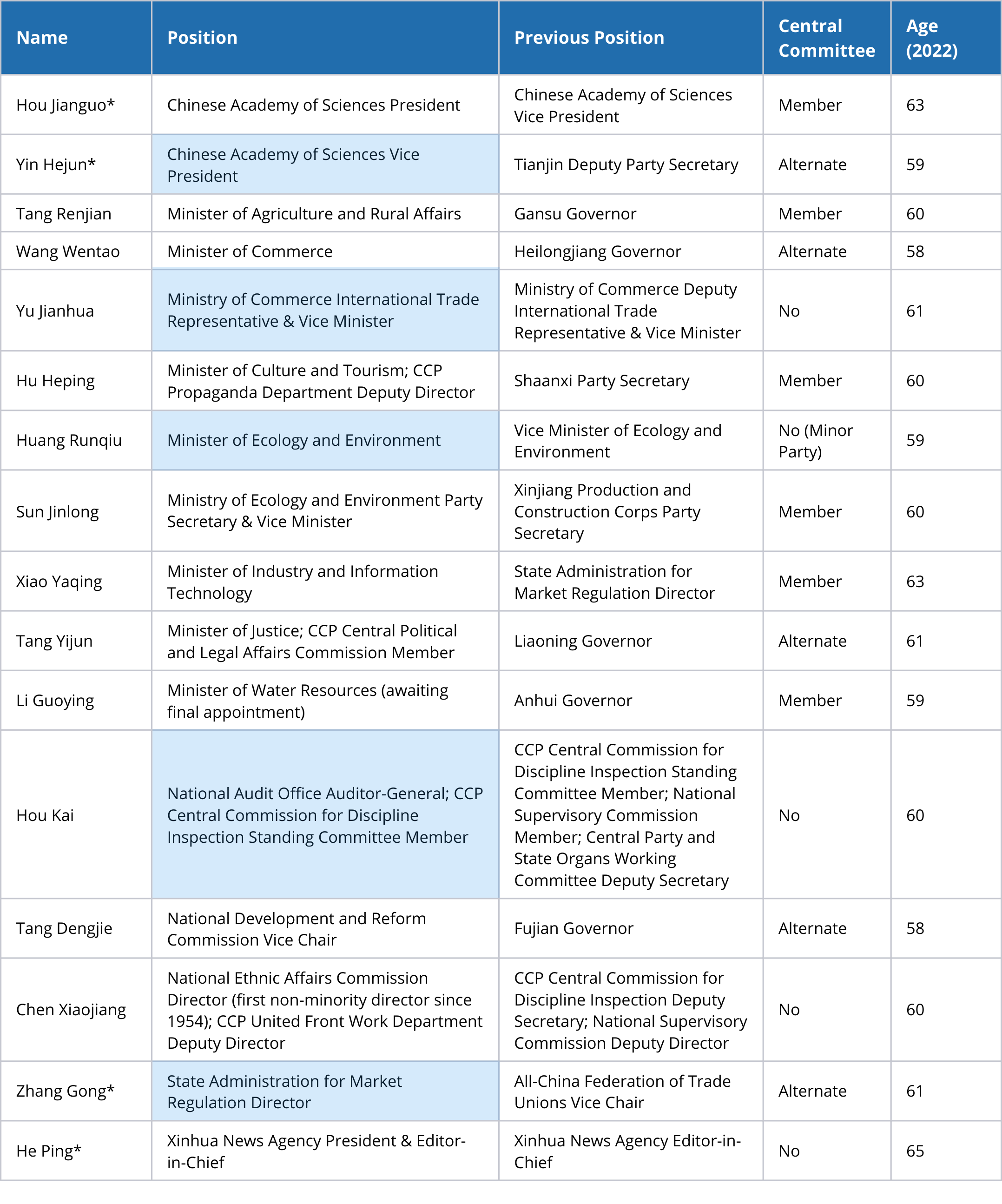In Part 2 of this series that looks ahead to the 20th Chinese Communist Party (CCP) National Congress in 2022, I examine key personnel changes in central Party agencies and State Council ministries over the past year.
As in Part 1 on
, I use career trajectory and demographic data from “
” to analyze recently promoted politicians. This series shows the importance of political networks for these rising stars, which we will analyze further as 2022 approaches.
The Party Center
Provincial leadership is the surest path to national leadership positions, but outstanding Party-State administrators can still advance. All seven of the ministerial-level politicians promoted in Party agencies last year will be younger than the mandatory retirement age of 65 in 2022, making them likely to feature in the next Central Committee (see Table 1).
Table 1. Ministerial-Level Promotions in Central Party Agencies since January 2020
Note: Blue shading shows a promotion from deputy provincial-ministerial level to full provincial-ministerial level. Others listed had already reached full provincial-ministerial level.
Source:
.
Perhaps the most significant promotion was of Meng Xiangfeng, who previously worked under Xi allies Cai Qi and Chen Xi in the Hangzhou and Liaoning governments, respectively. Meng’s ascension to Executive Deputy Director of the General Office—the executive office for Party leaders—suggests that he
current director Ding Xuexiang as Xi’s chief of staff, if Ding is promoted further in 2022. Should that happen, Meng would likely secure a seat on the elite 25-member Politburo, following in the footsteps of Ding and Li Zhanshu.
The elevation of Jiang Jinquan to head the Central Policy Research Office (CPRO) and the coterminous Central Comprehensively Deepening Reforms Commission Office is also noteworthy. The former agency is the Party’s top policy shop, and the latter is the vehicle that coordinates Xi’s reform agenda—where “top-level design” gets implemented.
Jiang
, the Party’s influential ideology czar and his longtime CPRO boss, indicating that Jiang is a policy wonk trusted by top leaders. It’s unclear why Wang handed over the reins last October, but given his age and his other positions, Wang ought to remain an important member of the Party leadership beyond 2022.
As for Li Shulei and Liang Yanshun, their promotions were likely influenced by having served under Xi when he headed the Central Party School from 2007-2012. Their trajectories reflect the emphasis Xi has placed on ideological campaigns and cadre education as tools
Party discipline
“self-confidence” in the political system.
The State Council
The political currency of state leadership roles has diminished under Xi. Only three members of the 19th Politburo (2017-2022) had worked as State Council ministers, compared to five in the 18th Politburo (2012-2017). Nonetheless, standout performers in the State bureaucracy, particularly those whom Xi believes he can trust, are still candidates for further promotion.
Nine of the 26 cabinet-level departments of the State Council have recently received a new head—a turnover rate of 35% (see Table 2). Three non-cabinet State Council agencies gained new chiefs, and three ministerial-level deputies were appointed.
Table 2. Ministerial-Level Promotions in the State Council since January 2020
Notes: Blue shading shows a promotion from deputy provincial-ministerial level to full provincial-ministerial level. Others listed had already reached full provincial-ministerial level. An asterisk indicates a person who leads a ministerial-level agency that is under the State Council but is not part of the cabinet. This list omits the unusual reshuffle of many older politicians into Hong Kong-related positions in early 2020. Yu Jianhua and Li Guoying were promoted in 2021.
Source:
.
With the exceptions of Huang Runqiu and He Ping, everyone on the above list is both a CCP member
and will be younger than 65 in 2022, qualifying them for the next Central Committee. But it’s the politicians with close ties to Xi who
to enter higher office.
Of interest is the successor to Politburo member Guo Shengkun, head of the Party’s Political and Legal Affairs Commission (PLAC), who should retire in 2022. His replacement will probably be a current PLAC member, implying a three-way race between new Minister of Justice Tang Yijun, PLAC Secretary-General Chen Yixin, and Minister of State Security Chen Wenqing.
Chen Yixin is
, but Tang also seems a serious contender. Both men worked under Xi during his tenure as Zhejiang Party Secretary (2002-2007). But compared to Chen, Tang sits on more policy leading groups, has provincial leadership experience, and holds a ministerial portfolio (like previous PLAC heads).
The two youngest new hires served under Xi during his brief stint as Shanghai Party Secretary in 2007. Tang Dengjie was a Vice Mayor from 2003-2011 and Wang Wentao was the head of Huangpu District. Tang, a former executive in state-owned armaments and auto companies, could well
as Chair of the National Development and Reform Commission.
Even if many rising stars have not
, they appear to have enjoyed the political patronage of Xi’s allies on the Politburo. Both Chen Xiaojiang and Hou Kai proved themselves in anti-corruption agencies, working under Wang Qishan, Yang Xiaodu, and Zhao Leji. Tang Renjian was twice Liu He’s deputy in the general office of the Central Financial and Economic Affairs Commission. Yin Hejun and Zhang Gong served concurrently as Vice Mayors to Cai Qi in Beijing. Hu Heping was a protégé of Chen Xi in the Tsinghua University administration.
All told, six of the nine new cabinet ministers either worked with Xi or one of his Politburo associates. Proximity to Xi now seems to hold more explanatory power for personnel shifts in Chinese elite politics than factional competition.


